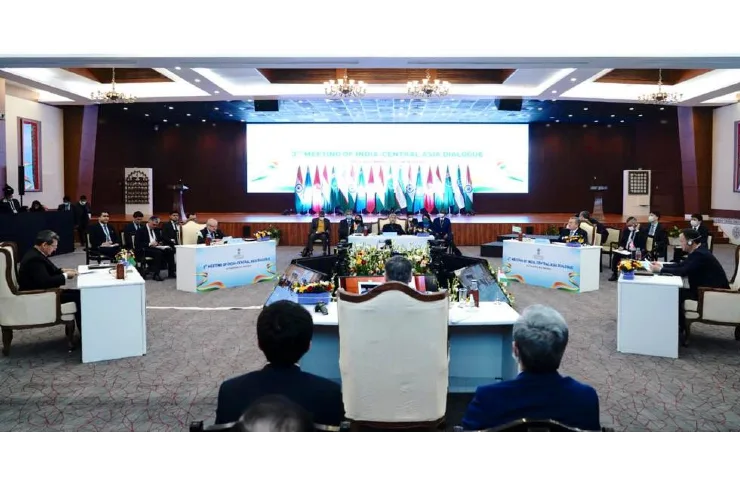

The third meeting of the India-Central Asia Dialogue in progress in New Delhi on 19 December 2021 (Photo: MEA/Twitter)
<p>
The foreign ministers of the Central Asian countries&mdash;Kazakhstan, Kyrgyzstan, Tajikistan, Turkmenistan and Uzbekistan&mdash;who are in Delhi for the third India-Central Asia Dialogue, have pledged their support to India for permanent membership in a reformed UN Security Council.<br />
<br />
The dialogue between the Central Asian republics and India is significant as it discusses the regional security situation arising out of the Afghan crisis after the fall of Kabul to the Taliban as well as coming out of the economic tailspin caused by the spread of the Covid-19 pandemic.</p>
<blockquote class="twitter-tweet">
<p dir="ltr" lang="en">
A warm and productive India-Central Asia Dialogue of Foreign Ministers.<br />
<br />
Discussed strengthening and enhancement of our partnership.<br />
<br />
Exchanged views on promoting greater trade, investment and connectivity.<br />
<br />
Agreed to expand our shared activities as cultural neighbors. <a href="https://t.co/Ca4R8E6hRb">pic.twitter.com/Ca4R8E6hRb</a></p>
&mdash; Dr. S. Jaishankar (@DrSJaishankar) <a href="https://twitter.com/DrSJaishankar/status/1472533023589474309?ref_src=twsrc%5Etfw">December 19, 2021</a></blockquote>
<script async src="https://platform.twitter.com/widgets.js" charset="utf-8"></script><p>
The six nations came out with a <a href="http://www.mea.gov.in/bilateral-documents.htm?dtl/34705/Joint_Statement_of_the_3rd_meeting_of_the_IndiaCentral_Asia_Dialogue">comprehensive joint statement</a> after the one-day dialogue.</p>
<p>
<strong>Improved connectivity<br />
</strong>The foreign ministers of the six nations emphasised on enhanced connectivity between India and Central Asia through the International North-South Transport Corridor (INSTC) and the Ashgabat Agreement on International Transport and Transit Corridor. The ministers have agreed to utilise the Shahid Beheshti Terminal at the Chabahar Port, an India-Iran joint project, within the framework of INSTC with a view to strengthening regional connectivity in Central and South Asia.<br />
<br />
<strong>Situation in Afghanistan</strong><br />
The six nations reiterated their support for a peaceful, secure and stable Afghanistan, focusing on the need to immediately provide humanitarian assistance to the common people. At the same time the foreign ministers also underlined the fear that &quot;Afghan territory should not be used for sheltering, training, planning or financing terror acts&quot; and called for action against terror groups.<br />
<br />
Pointing to the Delhi Regional Security Dialogue of 10 November 2021, the ministers agreed that there is a broad &lsquo;regional consensus&rsquo; on Afghanistan&mdash;which includes the formation of an inclusive and representative government, combating terrorism and drug trafficking and preserving the rights of women, children and different ethnic groups in the war-torn country.<br />
<br />
<strong>Battling Terrorism<br />
</strong>The foreign ministers also condemned terrorism, saying: &quot;…that providing safe haven, using terrorist proxies for cross-border terrorism, terror financing, arms and drugs trafficking, dissemination of a radical ideology and abuse of cyber space to spread disinformation and incite violence, goes against the basic principles of humanity and international relations&quot;. The joint statement said that &quot;perpetrators, organizers, financiers and sponsors of terrorist acts must be held accountable and brought to justice in accordance with principle of &quot;extradite or prosecute&rdquo;&quot;.<br />
<br />
In this context, they called for an early adoption of the UN Comprehensive Convention on International Terrorism, strengthening the UN-led global counter-terrorism framework, implementing the global counter-terrorism strategy and FATF standards.</p>
<p>
<em><strong><img alt="" src="https://www.indianarrative.com/upload/news/India_Central_Asia_dialogue_Jaishankar.webp" /><br />
<br />
The Indian team during the discussions with Central Asian republics in New Delhi (Photo: MEA/Twitter)<br />
</strong></em></p>
<p>
<strong>Cooperation on Covid-19</strong><br />
The countries emphasised on collective cooperation in the fight against the Covid-19 pandemic and its aftermath. They stressed on the importance of vaccination and called for continued cooperation through sharing of vaccine doses, transfer of technology, development of local production capacities, promotion of supply chains for medical products, and ensuring price transparency.<br />
<br />
The Ministers of Foreign Affairs of the Republic of Kazakhstan and the Kyrgyz Republic welcomed the mutual recognition of Covid-19 vaccination certificates between India and their countries while the Ministers of Tajikistan, Turkmenistan and Uzbekistan looked forward to early mutual recognition of vaccine certification with India.<br />
<br />
<strong>Climate change initiatives</strong><br />
India invited the five Central Asian republics to join some of its leading initiatives in combating climate change and natural calamities. It highlighted the role of the International Solar Alliance (ISA) in deploying solar energy globally to meet the goals of the Paris Agreement. It also underlined the role of the Coalition for Disaster Resilient Infrastructure (CDRI) in promoting disaster resilient infrastructure for reducing economic losses and improving the well-being of communities in the face of natural calamities.<br />
<br />
<strong>High Impact Community Development Projects<br />
</strong>The foreign ministers supported India&#39;s development initiatives in the form of High Impact Community Development Projects (HICDPs) based on grant assistance by India. The ministers discussed the utilisation and progress over&nbsp;the $1 billion Line of Credit (LoC) announced last year for infrastructure development projects in Central Asian countries.<br />
<br />
The six nations also resolved to gradually restore people-to-people contacts, tourism and business ties between India and the Central Asian countries.</p>
As India continues to get World support against the Pahalgam Terror attack that killed 26…
Union Minister of Industry and Supply Piyush Goyal on Saturday highlighted the success of a…
In a display of outrage following the Pahalgam terror attack, thousands from the Indian community…
In a continued crackdown following the Pahalgam terror attack, security forces and Jammu and Kashmir…
In a massive statewide crackdown, over 550 illegal immigrants from Bangladesh were detained in Ahmedabad…
The Deputy Chief of the Main Operations Directorate of the General Staff of the Russian…